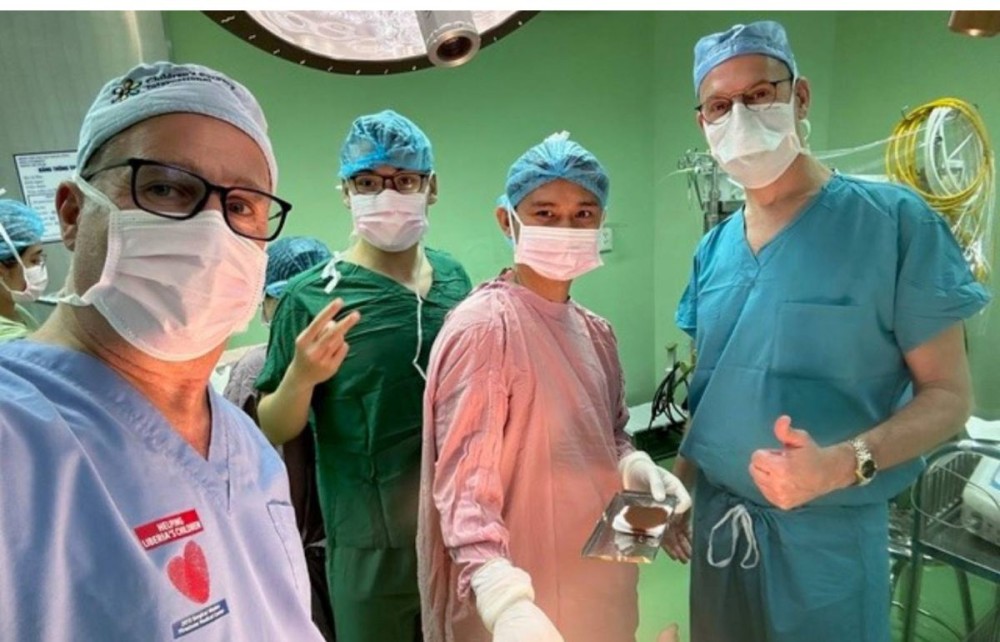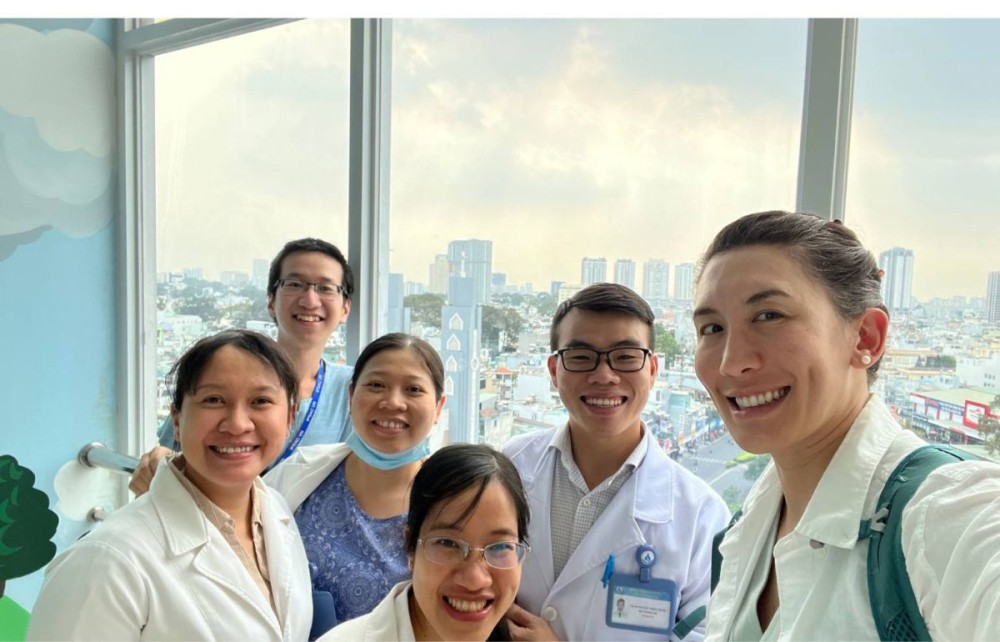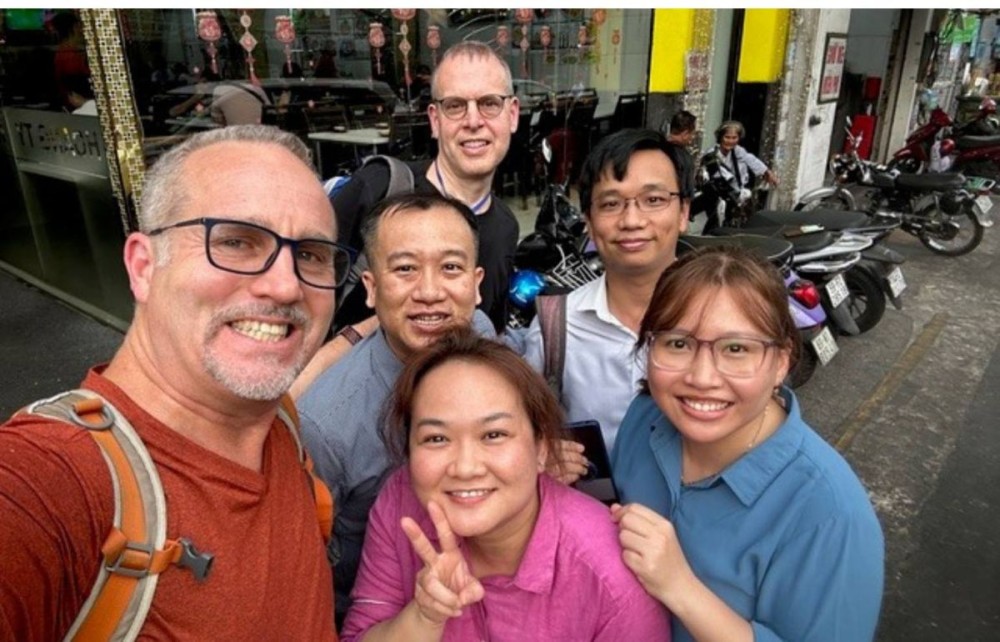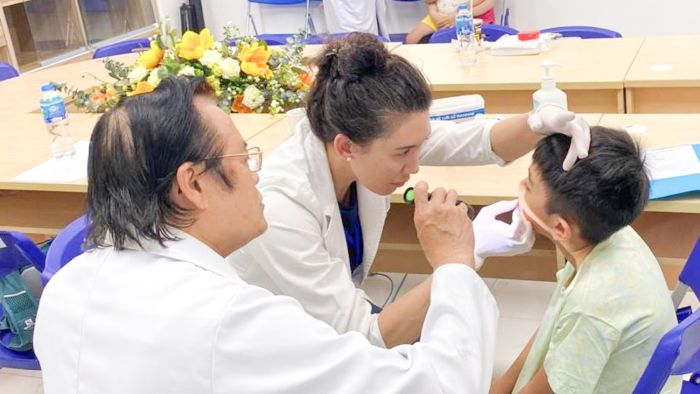Three Gillette Children’s surgeons recently traveled to Vietnam on a mission trip to help physicians in that country learn techniques to better serve patients.
Gillette craniofacial and plastic surgeon, Jo Barta, MD, pediatric neurosurgeon, Patrick Graupman, MD, and pediatric urologist, David Vandersteen, MD, spent a week in Vietnam as part of a mission for the International Pediatric Specialists Alliance for the Children of Vietnam (IPSAC). The organization was founded by a surgeon who came to the U.S. as a refugee in her childhood. IPSAC brings surgeons from all areas of expertise and many countries to help train young Vietnamese surgeons.

Gillette pediatric urologist, David Vandersteen, MD, (left) has traveled on mission trips to Vietnam since 2011.
Teaching and collaborating
Dr. Barta has been on many surgical volunteer trips during her career. She strongly believes in sharing her expertise to improve care for individuals with congenital craniofacial differences. Dr. Barta was introduced to IPSAC by Dr. Graupman. The two work closely at Gillette to serve craniofacial patients. “Dr. Graupman has volunteered on several of these trips with IPSAC. When I heard they have never had a craniofacial pediatric surgeon on the team, I jumped at the opportunity to participate,” Dr. Barta says.
Dr. Barta found the IPSAC trip very rewarding. “This trip was more about teaching and collaboration than just performing surgery. I enjoy connecting with colleagues from a different culture and practice,” she says.
“Working with IPSAC allows me to share my knowledge and skill with other physicians, who then can go on to use that knowledge and skill for providing greater care to their patients. I always come back with a few new skills I learned from them too,” Dr. Barta adds.
Dr. Graupman agrees, adding, “I admit I was a little bit nervous on my first trip over to Vietnam based on the past shared history of our two countries. I was pleasantly surprised that it was a complete non-issue.”
Dr. Vandersteen has been going to Vietnam since 2011 and was disappointed that COVID interrupted his visits for a few years. He’s pleased to be back and appreciates the opportunity to work with IPSAC. “Going to Vietnam is a unique mission trip because, unlike many mission locations, they have doctors with tremendous surgical skills. What they desire is fine tuning their skills and clinical decision making.”

Dr. Barta (far right) strongly believes in sharing her craniofacial and plastic surgery skills with colleagues in Vietnam.
Stewards of health care resources
Dr. Barta says mission trips like these remind her of the importance of being a good steward of health care resources.
“The health care resources in Vietnam are limited and the access to health care or the ability to pay for certain procedures is more difficult for people there,” Dr. Barta says. “The amount of time spent training for a medical specialty is much longer in the U.S. than in Vietnam. The surgeons in Vietnam need to be very creative and adaptive so they can achieve the best care possible for their patients with the resources they have.”

Dr. Vandersteen says the people in Vietnam are "wonderful" and he has made many lifelong friends on his mission trips.
"Teach a man to fish..."
Dr. Barta appreciates the fact that IPSAC is not an organization with a "medical tourism" approach.
“Unlike many surgical volunteer trips where the primary goal is to perform surgeries in underserved communities but often do not have long term follow up or after surgical care, IPSAC partners with physicians in Vietnam to both provide complex surgical care and teach them procedures,” Dr. Barta says.
“This approach of ‘teach a man to fish’ elevates their medical knowledge and allows them to continue to provide high quality care,” Dr. Barta says. “The physicians who volunteer with IPSAC are teaching, and performing procedures that are part of their areas of expertise within their home institutions. IPSAC has also been able to bring highly specialized equipment to perform difficult procedures, through donations that support the mission and goal of IPSAC.”
All three Gillette doctors say they value the new relationships formed with colleagues in Vietnam. “My favorite thing now is the relationships I have built with my pediatric neurosurgical peers in Saigon,” Dr. Graupman says.
Dr. Vandersteen adds, “We have made many lifelong friends on our trips to Vietnam. Wonderful people!”
Gillette's global advocacy mission
The vision of Gillette is to create a world in which every child is able to create their own story. Global advocacy is one of the main pillars of our mission. Dedicated doctors throughout Gillette help put our mission and vision into action to help improve the lives of children around the world.
 Home Page
Home Page

